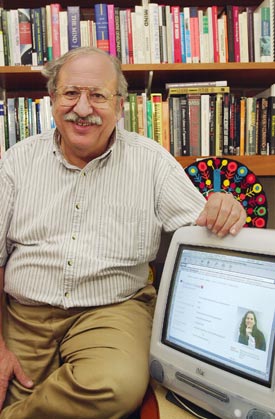Ganz organizes peer network

Marshall Ganz knows better than most what community organizers are up against out there: trying to change minds, taking risks, supporting sometimes unpopular causes – and often with not much help around.
Ganz, a lecturer at the Kennedy School who served as an organizer for 28 years – including 16 years with Cesar Chavez’s United Farm Workers – is doing what he can to help. While he can’t send hordes of volunteers or thousands of dollars, he’s created a long-range community of organizers where the stressed-out, the struggling, and the successful alike can come to share ideas, look for leads, or just find a word of comfort.
Ganz’s Peer Learning Network is an organizing solution direct from the Internet Age. Ganz, who uses little technology in his classes, used a grant from the Provost’s Fund for Innovation in Instructional Technology to put together a multilayered Web site. The site offers spotlights of different organizers, lists of resources and contact numbers, a discussion forum, profiles of participants on the site, and “reflection,” where members can post inspirational messages and sayings.
Ganz, who as an undergraduate left Harvard before graduating to work on the 1964 Mississippi Summer Project and returned in 1991 to complete his bachelor’s, master’s, and, in 2000, doctorate, said the Peer Learning Network grew out of his popular Kennedy School class, “Organizing: People, Power and Change,” and an undergraduate version, Sociology 96. The class, which attracts participants from varied backgrounds, provides students with an intensive, hands-on experience in organizing. Ganz said he regularly hears from students who’ve completed the course, seeking advice and updating him on their activities. He said it became apparent that there was a need for something that would let organizers talk to, share ideas with, and get advice from other organizers.
The Peer Learning Network, developed with the help of Jennifer Fey, a master’s degree student at the Divinity School, is the result.
“The key thing is to take it beyond a mentoring relationship [with an instructor] and take it to a collaborative mentoring process where people are learning from each other,” Ganz said.
Membership in the network is drawn from the rolls of Ganz’s class. At the end of each semester, he asks students if they want to be part of the network, and those who express interest are included. There are already 285 participants in the network, hailing from the Graduate School of Education, the Divinity School, and the Business School as well as the Kennedy School. Ganz said the varied backgrounds of participants means they are dealing with similar problems in different situations. That diversity in application of organizing principles makes the network a potentially powerful tool for learning.
Today’s organizing environment makes a forum like the Peer Learning Network critical, Ganz said. There are fewer large movements and more smaller nonprofits working on a range of causes, he said. That means organizers at these small organizations are more isolated than before.
“There’s lots of fragmentation,” Ganz said. “People aren’t collaborating.”
Ganz said the part of the site with the most potential is the discussion forum, where ideas can be brainstormed and problems analyzed by network members. Unfortunately, Ganz said, this capacity is still being developed because it requires costly, sophisticated software. Having active, ongoing discussions would transform the site from a static resource to a living community.
Lisa Boes, a student at the Graduate School of Education who took Ganz’s organizing course and provided feedback as the site was developed, said the powerful thing about the class is that students learn from each other. It is that peer-learning experience, she said, that is translated to the network.
“Students start learning from each other in the class and this allows them to continue to learn and use each other as a resource after the course,” Boes said.
Boes said she taught a seminar last fall at Tufts modeled after Ganz’s course and an undergraduate seminar at Harvard College this spring and used the site as a reference for students as they thought about projects. Boes said the site can be a resource, not just for students nearby, but for people nationally and internationally.
“A lot of people are working in areas where they don’t have the support of having a lot of other organizers around, so the network provides a forum,” Boes said. “It also is a way to share many of our resources nationally and internationally with people in other communities and on other campuses who haven’t taken the class but are interested in the ideas.”
You may visit the Web site at http://www.ksg.harvard.edu/organizing




